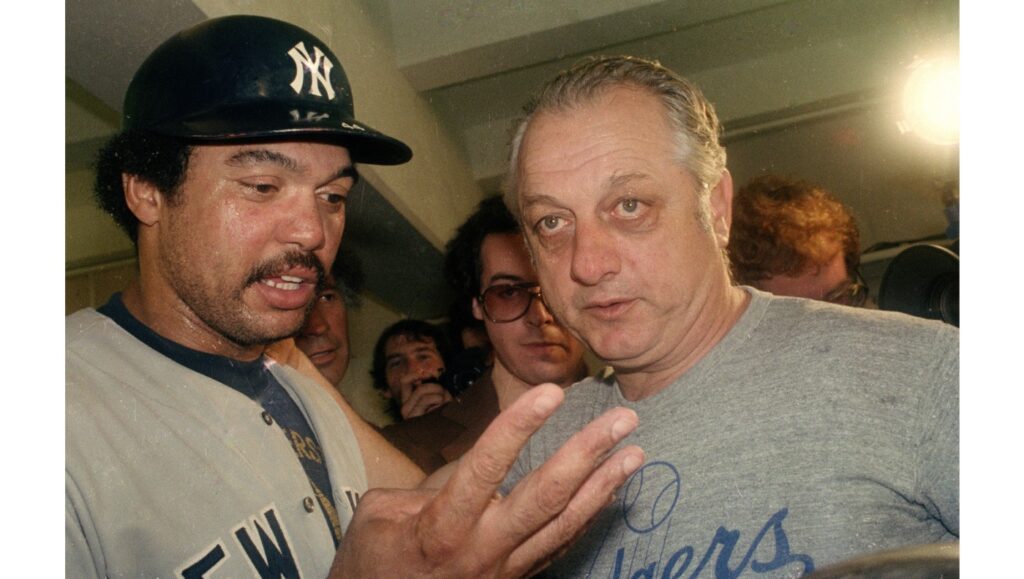
The Dodgers and New York Yankees will enter October with a chance to meet in the World Series for the first time in 41 years. Nostalgia is in the air among baseball fans in the nation’s two largest media markets, and ESPN Films has seized on an opportunity to capitalize.
The five seasons from 1977-81 saw the Dodgers and Yankees play each other for the championship three times. Their 1977-78 World Series duels are the subject of a new documentary, “Yankees-Dodgers: An Uncivil War”, which airs Tuesday night on ESPN.
The time period, and the surrounding cultural moments in Los Angeles and New York, are as much a subject as the two teams. The historic details lean more heavily toward Manhattan, where the Son of Sam murder spree and the citywide blackout in July 1977 remain strong memories for those who experienced them first-hand.
Director Fritz Mitchell grew up 45 miles north of New York City – a Baltimore Orioles fan, oddly enough – and remains fascinated by the time period in history.
“I try to appeal to sports fans as well as non-sports fans. There’s a broader story, a context to the time period,” Mitchell said in a telephone interview. “Baseball was coming into that free agency period. The ’70s were in full swing with the hubris and greed. There is a certain fascination with that. Because I’m a child of the ’70s, I’m fascinated by what the ’70s are all about.”
For baseball and television executives alike, what better manifestation of greed than seeing the Yankees and Dodgers routinely meet in the World Series?
Big ratings were not a given, as baseball had begun to decline from its perch as the undisputed national pastime. Perhaps it was no coincidence that the championship matchups of the decade were dominated by six teams from mostly small markets. Oakland, Cincinnati, Pittsburgh and Baltimore combined with the Dodgers and Yankees for 18 of the 20 World Series appearances from 1970-79.
Against this backdrop, the Dodgers’ and Yankees’ coincidental ascent had the potential to lift a league in need of a lift.
“Football’s really just starting to take off, where football takes the mantle from baseball in the course of the ’70s,” Mitchell said. “By the mid-to-late ’70s, the (Pittsburgh) Steelers and (Dallas) Cowboys overtake the NFL. Yankees-Dodgers, Reggie Jackson, Billy Martin, Tommy Lasorda – baseball was still holding on.”
The main avatar for individual greed was Jackson, whose on-camera interviews revealed a rare level of candor from a complicated figure in the sport’s history.
Jackson earned his nickname, “Mr. October,” after his performance in Game 6 of the 1977 World Series, when he hit three home runs against three different Dodger pitchers in the clinching game. Off the field (and occasionally in the Yankee dugout), Jackson’s outsized personality captivated the press in a way few baseball players have before or since.
Mitchell said Jackson was eager for the documentary to capture the turmoil that surrounded him behind the scenes in the Yankees’ clubhouse. Jackson, Mitchell said, told him: “Don’t get everybody who’s just going to speak nicely about me. Get people who aren’t going to speak nicely about me.”
Related Articles
Dodgers beat Cardinals, clinch NL’s top playoff seed
For Dodgers’ Andre Jackson, striking out Albert Pujols was a breath of fresh air
Dodgers get mojo back with homers and strong start from Clayton Kershaw
Dodgers place Dustin May on injured list for rest of regular season
Alexander: Dodgers’ Bickford, Heaney on wrong side of Albert Pujols’ historic night
Jackson’s counterpart as the most recognizable Dodger, first baseman Steve Garvey, cut a contrasting image – clean, friendly, and easy to root for in an uncomplicated way. Other than Garvey and the outsized personality of Tommy Lasorda, a rookie manager in 1977, Mitchell conceded that the Dodger teams of the 1970s were more difficult to encapsulate as a filmmaker.
In the end, perhaps that was apropos. The Yankees won both World Series matchups in 1977 and 1978. The Dodgers’ revenge victory in 1981 receives relatively light treatment at the end of “An Uncivil War.” Only then did the franchise come into its own under the guidance of Lasorda, unburdened by comparisons to the Yankees in the popular media.
Even if Dodgers-Yankees World Series become a rite of autumn again, Mitchell believes it will never be the same as it was in 1977-78.
“There’s a mistrust among players and reporters that started in the early and mid-70’s,” he said. “Now college athletes are schooled on what to say and what not to say to the press, what to give them. (At that time), reporters could walk into a locker room and talk about anything but there was a tacit understanding there were things you would report and wouldn’t. These teams came along where they were ripe for the picking.”
UP NEXT
Dodgers (Tyler Anderson 15-4, 2.52 ERA) at San Diego (Blake Snell, 8-9, 3.62 ERA), Tuesday, 6:40 p.m., SportsNet LA, 570 AM
The Dodgers’ Davey Lopes begins to slide into home plate as New York Yankees catcher Thurman Munson waits for the throw during the third inning of Game 5 of the 1978 World Series on Oct. 15, 1978, at Yankee Stadium. The teams met in the World Series three times in a five-year stretch, with the Yankees winning the first two in 1977 and 1978. (AP Photo)
